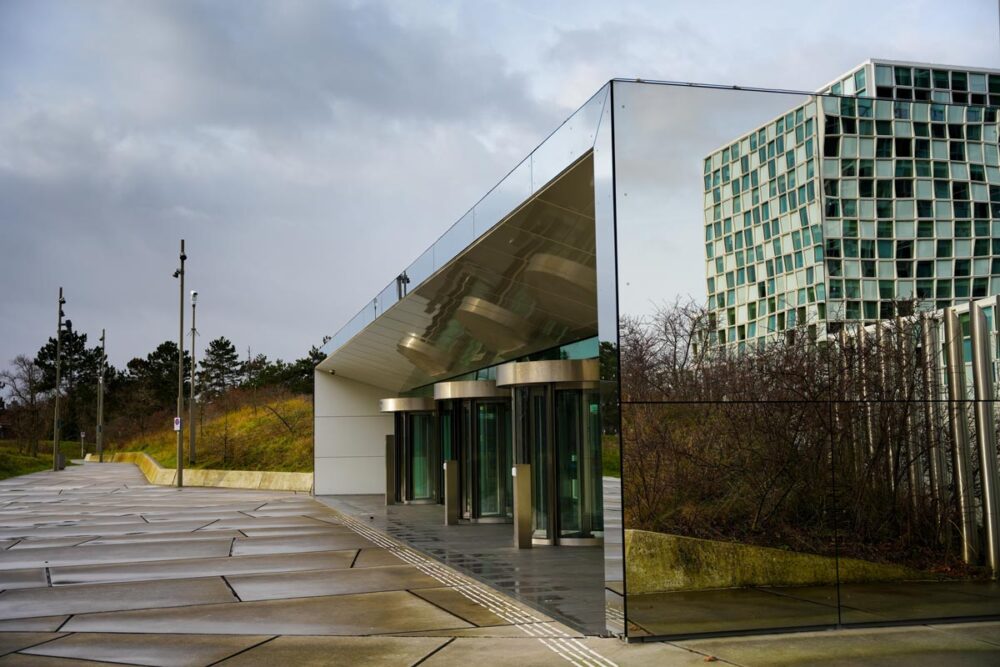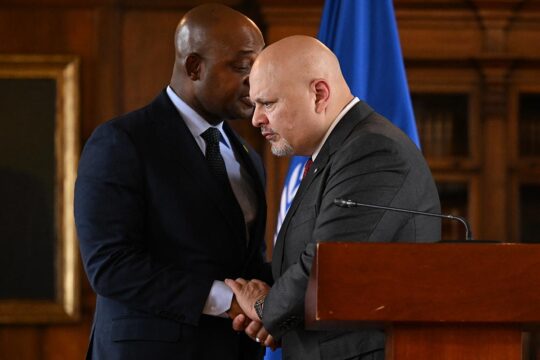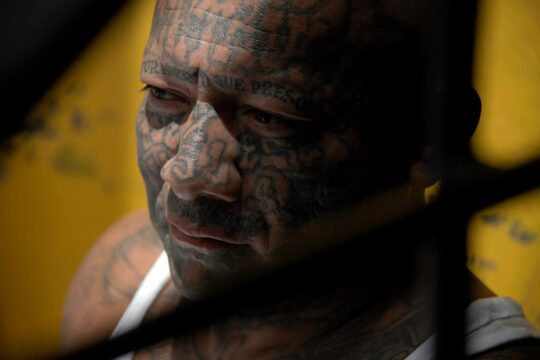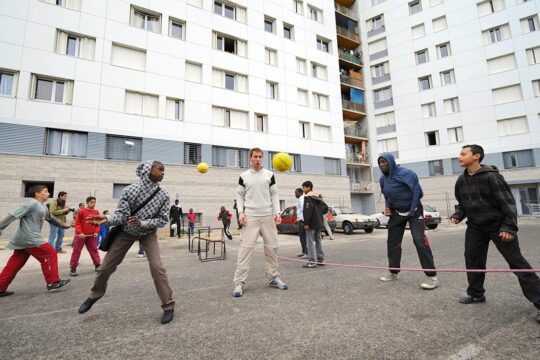As the International Criminal Court’s prosecutor pushes on with arrest warrants against leaders of Israel and Myanmar, the court’s supporters meet in The Hague this week to decide on the regular knotty problem of how much states are willing to pay for justice for atrocity crimes.
Every year the representatives of the now 124 member states (Ukraine will join officially in January) that fund the ICC meet in the Hague or New York to discuss the budget. This year prosecutor Karim Khan has provided a welcome fillip to the mood by announcing last week his intention to seek an arrest warrant against Myanmar’s military ruler, in relation to the alleged crimes against the Rohingya and their deportation over the border into Bangladesh, which is an ICC member state.
But this year’s context looks particularly strained. The ICC states parties face a decision on how to investigate the prosecutor’s alleged sexual misconduct. And, come January, when Donald Trump becomes the US president again, the court is likely to face sanctions – in retaliation against the arrest warrant for Benjamin Netanyahu, a staunch ally of the coming US administration – that will pose an even greater challenge. “They have the potential to sanction the actual institution, which would be an absolute disaster. It is an existential threat for the court,” says Maria Elena Vignoli of Human Rights Watch. “We don't know what ultimately will come down,” says James Goldston, the head of Open Society Justice Initiative, an NGO, “but they are potentially devastating. No question about that.”
Growing outside pressure
The court was long criticised for its focus on Africa. All the individuals who have been tried since 2002, when the court became active, are Africans. Its six successful prosecutions have all been for medium-level rebel commanders across that continent. Now the court has been able to break out into Asia, Europe and the Middle East and challenge some of their heads of state or governments for their alleged responsibility in crimes against humanity. But 2025 also looks set to be the year when the states finally have to decide where they stand on implementing international justice rules and how they can fix some of the flaws in the body they built.
The vulnerabilities of the international criminal court have been visible on several fronts. After Putin’s indictment by the court a cyber-attack in 2023 caused a return to paper binders and USB flash drives to run cases. A whopping 4.3 million Euros is still needed to fix those systems and restore security. Russia has opened criminal cases against elected officials. Former prosecutor Fatou Bensouda has also spoken of the bullying tactics she says were employed against the court’s officials by Israel. And Israel continues to be suspected of targeting the court.
Meanwhile, the office of the prosecutor is being asked to do more and more. States continue to refer situations. Last week Chile along with Costa Rica, Spain, France, Luxembourg and Mexico called on the prosecutor to focus on women in Afghanistan, and earlier this year Lithuania pointed to crimes against humanity in neighbouring Belarus. This year the Office of the Prosecutor requested an additional €9.31 million (a 15.4 per cent increase) on last year. But the committee on budget and finance admonished the prosecutor’s office for over-reliance on external contractors and urged it to get its human resources recruitment system in order.
Slow internal reforms
It was in 2019 that states decided that a root and branch review of the court was needed. The Independent Expert Review led by South African Justice Richard Goldstone exposed some ugly truths about the failures of parts of the Rome Statute system to operate effectively in dealing with atrocity crimes and poor morale in key areas like the Prosecutor’s office. The reform process has been implemented by states, with reports to the Assembly of States Parties (ASP) every year. OSJI Goldston (no relation) notes that some reforms are trickling through – there’s now a process of vetting for candidates for senior roles and judges have recently changed certain rules which now allow them to “move at a pace that at least more approximates the expectations of various stakeholders” than before.
But, he says, “at the same time, I think there has not been sufficient progress in addressing what the independent expert review identified as a really challenging, very toxic environment internally for many staff of the court when it came to their work environment and the lack of trust that was exhibited apparently by many members of the staff, of the internal disciplinary processes and review processes that ostensibly existed to address concerns about harassment and hostility in the workplace. I just don't think we've seen enough progress in respect of that.”
Should Karim Khan step aside?
That continued poor work environment and the mistrust in the internal disciplinary procedures embodied in the court's own Independent Oversight Mechanism publicly erupted via a sexual misconduct allegation against the prosecutor himself. The alleged victim refused to cooperate with the court’s investigators. Instead, members of Khan’s office have leaked alleged elements of the situation to members of the media. The prosecutor has now agreed that an investigation is needed. How independent it will be of the court and what it would cover, including any allegations of a smear campaign against him, are still unclear.
Against that backdrop, several senior NGO figures have called for the prosecutor to temporarily step aside “while such an investigation is proceeding without prejudice, of course, to his right to be presumed innocent and without taking any sides about the allegations that have emerged,” says Goldston. “There's no reason why stepping aside and leaving it in the hands of his capable either one or both deputies and the staff that support them should in any way prejudice the progress of any continuing investigation or prosecution.”
Alix Vuillemin of Women’s Initiatives for Gender Justice, whose organisation wrote jointly with FIDH on this matter, agrees that “the best, perhaps the most gracious thing to happen would be for him to step aside for the moment. He's clearly indicated he won't. Perhaps we can help change his mind, since he took a very strict zero tolerance approach with his own staff, that could be a measure of fairness.”
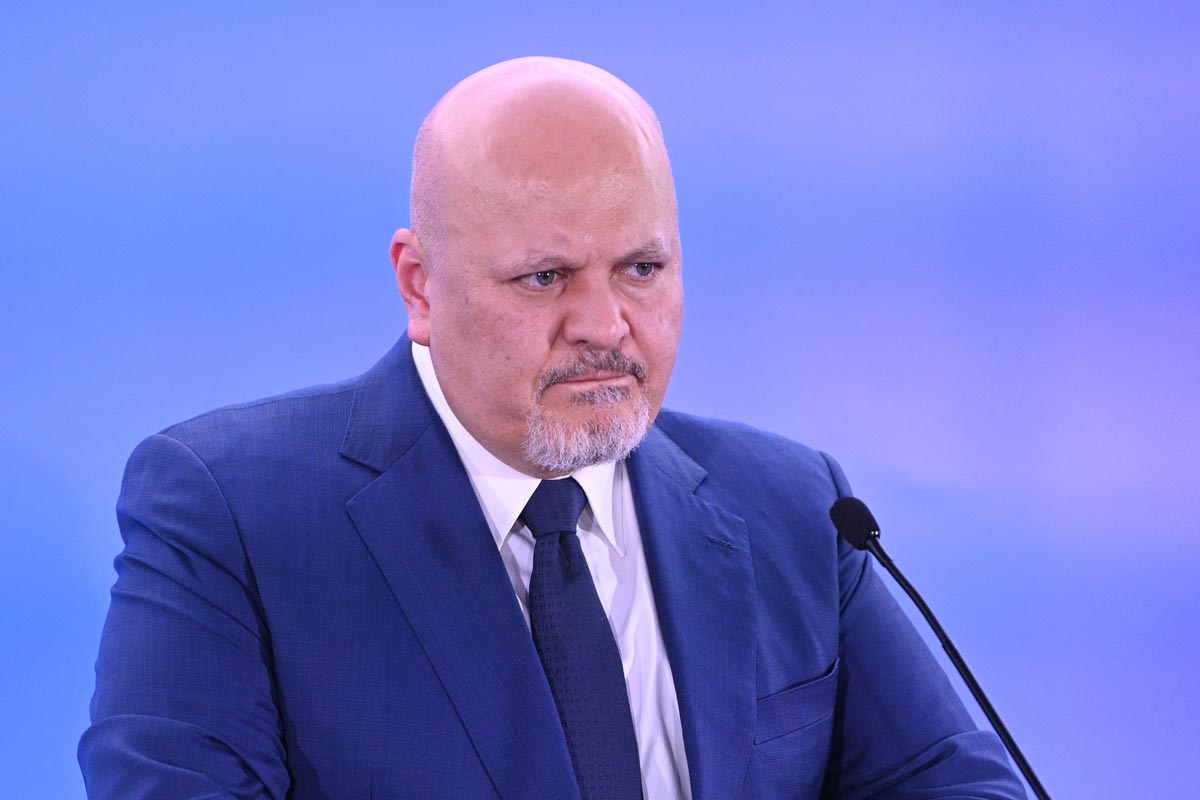
Vuillemin though points out the bigger picture – that “the rules around this issue are very vague”. She recalls how the first ICC prosecutor Luis Moreno Ocampo advocated hard for the independence of his office from potential state interference and the court ended with a relatively weak internal oversight mechanism: “And now we see the consequences of that”. (Allegations of misconduct against Moreno Ocampo were subject to an internal investigation whose conclusions were never disclosed.) It is also hard to see how a prosecutor would not be automatically weakened by having to step aside, and with him the whole institution.
Victim’s interest and outside influence
So what is the solution? “It's a very tricky question,” says Vuillemin, because of the precedents that this may create, “particularly because, of course, of potential for politicisation and the risks that could come in in future”.
Under the Rome Statute, states can remove a prosecutor by a majority secret ballot if they are “found to have committed serious misconduct or a serious breach of his or her duties”. Instead of anything like such a drastic step, Vuillemin is “asking the states to focus on the allegations, and particularly being survivor-centred in all of this, not to be distracted by the politics around this, but to focus first on this particular situation. The system at the ICC to address these sorts of allegations may not be broken, but [it is] insufficient”.
As states are absorbing the flurry of judicial activity in the last few months at the court and especially the issuance of an arrest warrant against Netanyahu, there is a risk that any investigation into the man pressing for that arrest warrant, Karim Khan, could be politicised. At the moment observers say that the ASP’s president Päivi Kaukoranta is playing her cards close to her chest.
Vuillemin says it should be up to external independent investigators as to where their inquiry leads. “Any, good proper investigator or team of investigators will necessarily judge the credibility of the allegations,” she says. “They will over the course of their work find out quickly enough if there's any reason to broaden the scope of their mandate. I cannot imagine that it would not be part of their terms to investigate potential outside influences,” as Khan has suggested.
Two separate issues
Stephen Rapp is the former US ambassador at large for war crimes, and a former chief prosecutor at UN tribunals. He sees the dangers of how the sexual misconduct allegations can be weaponised against the court’s most sensitive investigation. “These are entirely separate issues,” he emphasises. “The cases that the court pursues on every front should continue to be pursued at the same time as there is an appropriate investigation of alleged misconduct by Khan or if there are allegations against other persons.”
But Goldston notes that the allegations are “already are being used or misused in ways that are not helpful to the court”. Nevertheless, he says, “the fact that enemies of the court are willing to misuse these kinds of allegations for their own purposes doesn't, in my view, mean that the prosecutor or the court itself should forgo what is the professionally and ethically responsible thing to do,” which is, in his view, to step aside temporarily.
Which budget for 2025?
Eventually the meat of the debates will be around the threats to the court and its functioning, and the budget needed for its work.
“The baseline problem is that the court is operating in a situation of chronic underfunding,” says Vignoli. After several years of a group of countries pushing for zero nominal growth, “which was completely arbitrary,” she says, since 2022 there's been “an acknowledgement that the workload of the court has increased. Some of the states that in the past were more stingy, less progressive in terms of the court's budget like France, Canada, the U.K., Japan, and Germany were being much more progressive. There have been budget increases over the past three years, but they have been overall minimal and they have not solved the underlying problem of chronic underfunding.”
This year, the Court has proposed an annual budget of 202,612,400 euros, representing an increase for 2025 of 19,113,200 (or 10.4 per cent) over the approved budget for 2024. But the Budget and Finance Committee concluded that a total increase of 6.6 per cent should be sufficient.
The proliferation of special funds
A notable feature of the last couple of years has been the proliferation of special funds to support specific aspects of the court’s work. “We are very wary about voluntary contributions overall,” says Vignoli. “To start with there is a lack of transparency.” When states decided to give some extras for the Ukraine investigation, the Office of the Prosecutor established a special trust fund and designated three areas to which the 33 million euros now raised is going: improving the analysis of information, sexual and gender-based crimes along with those against children, and psychological support. But Vignoli is concerned there's little public information about “how that money is used besides the three main buckets”. A separate Trust Fund for cooperation was also established of some 125,000 euros for working with local justice actors in the Democratic Republic of Congo and capacity building at the Central African Republic special court. “We're not saying they shouldn't be there,” says Vignoli. “But they have been used over the past few years to fill gaps that were left in the regular budget. And that is a problem because voluntary contributions are not meant to cover the core activities of the court.”
“There's also the issue of politicisation, when a minister of foreign affairs of State X makes a contribution and then says, we just gave X million for Ukraine or for Palestine. It's problematic in terms of perception.”
And there's an issue of sustainability. “States use this as an excuse to keep the general budget down. It creates this vicious cycle, where the court doesn't have enough, so asks for voluntary contributions. And then states say, look, we've given you voluntary contributions so we don't need to raise the budget. It's hard to break this cycle.”
US sanctions
With the arrest warrants announcement by ICC judges in the Palestine situation, the court now faces political fractures in the system. France has declared that it is not obliged to follow the ICC rulings on head of state immunity, and would not arrest Netanyahu if he visited Paris. There is also direct fire from across the US political spectrum, in defence of Israel’s war. When Donald Trump was last in power in Washington between 2016 and 2020, his administration froze the assets of the then-prosecutor Bensouda and a member of her staff.
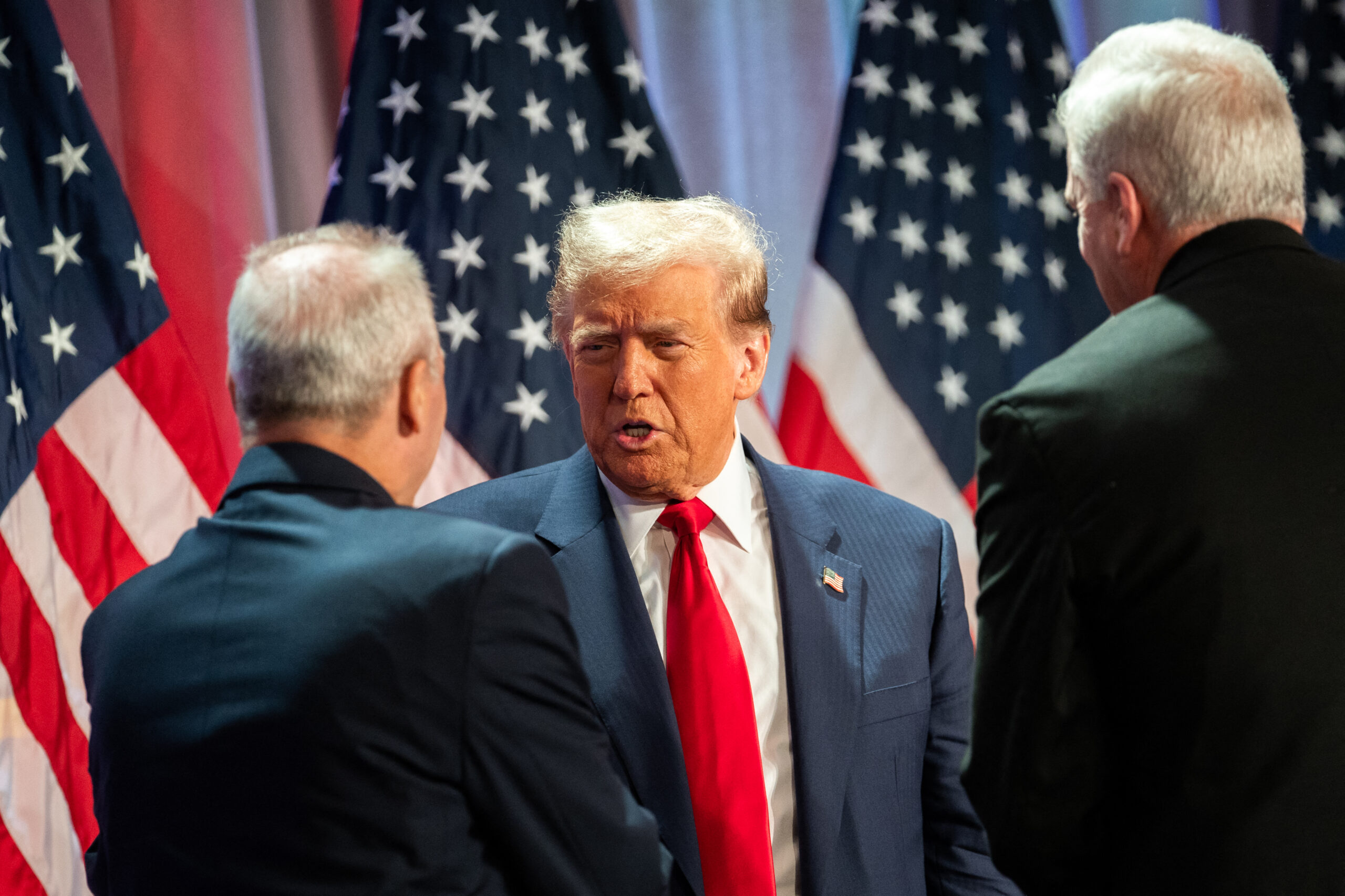
then-prosecutor Bensouda and a member of her staff.
“It's a very fraught situation,” says Goldston, who points out that “the incoming Senate majority leader has made clear his desire that the Congress act on that threat of sanctions as soon as it comes into being in January”. And that “the Trump administration itself has the power to impose sanctions, by executive order, in addition to anything Congress does”.
Goldston warns of the potential consequences of sanctions: “The sanctions could be really a devastating blow to the court, simply because such sanctions in principle can essentially cut off the court's ability to function, its ability to retain and command and preserve the services of a variety of vendors, of banking services, of all kinds of things, or IT services, which are likely to have dollar components that run through the U.S.” In addition, he says the court’s cooperation agreements with a number of other states would be likely to suffer.
“When I was [U.S.] ambassador at large for six years [under Obama’s administration], we worked very hard to become a ‘non-party partner’, and to work with the court on a case-by-case basis as our law allows,” recalls Rapp. “That provided very specific assistance in bringing the two fugitives Bosco Ntaganda and Dominic Ongwen to the court. They surrendered to our officers, and we worked very hard to get them to the ICC, where to date they're the two strongest cases with the longest sentences of any of the six cases that have gone through trial and sentenced at the court. Frankly, these courts need that kind of assistance from states if they're going to be successful. Their own warrants, and their own orders are, in the end, meaningless without state cooperation, and that includes the cooperation of non-parties. And obviously, any effort to go after the court and to sanction its prosecutor or his staff or other arms of the court or the court itself would necessarily undermine that effort to achieve accountability for the crimes being committed in Ukraine.”
Other clouds on the horizon
Double standards are clear, Goldston stresses. “It was not long ago that some of the same people calling for sanctions [against the ICC] now in respect of Israel and Palestine were going out of their way to applaud the court for its work in respect of Ukraine and support charges against President Vladimir Putin of Russia. I think it is worth underscoring the fact that even in the narrower view of certain elected officials, this court serves an interest of addressing serious crimes in certain situations.”
What will the ASP actually do though? “The ASP is a very important platform and forum for states to express support for the work of the court, and explicitly condemn these threats, especially sanctions. But that's not enough. It will also be an opportunity to have conversations with EU countries to see where they are with active preparation and support,” says Vignoli.
Meanwhile, the court is also gearing up for a special review meeting on the fourth crime in the Rome Statute - that of aggression. And Vanuatu along with other states wants to change the court’s statute with a new crime of ecocide to be added. “Definitely we are going to talk about it and build support” at the ASP, Vanuatu’s special envoy on climate change Ralph Regenvanu told Justice Info. But he was not sure if now would be the best time to put the issue to a vote.
Other huge clouds on the ICC’s horizon include the limited functioning of the Trust Fund for Victims, the reparations arm of the Court. The Budget and Finance Committee complains that the Trust Fund still has not put a transparent fundraising strategy together. That is despite the awards made by the court’s judges of more than 86 million euros for reparations in the cases of Ntaganda in the Democratic Republic of Congo and Ongwen in Uganda.
And then there is concern that the courtrooms in The Hague are going to look growingly empty, even though the Prosecutor has been busy applying for arrest warrants, with arrests not happening (see our article tomorrow).




